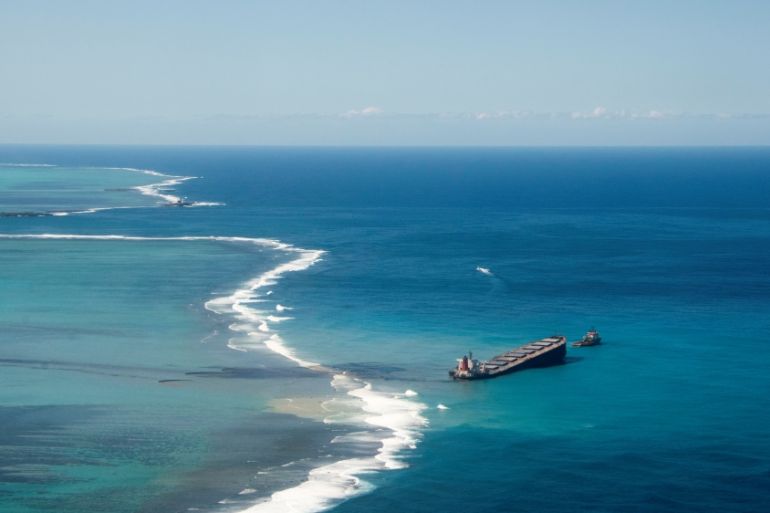Protest in Mauritius over oil spill, dozens of dead dolphins
Leaked fuel from a Japanese tanker fouled protected wetlands area and small island that was bird and wildlife sanctuary.

Honking and drumming, hundreds of people are protesting in the capital of Mauritius over the government’s handling of an oil spill from a grounded Japanese ship and the alarming discovery of dozens of dead dolphins in recent days.
The protesters waved the country’s flag on Saturday and held up signs with messages such as: “You have no shame.”
Keep reading
list of 4 itemsTurtles swimming to extinction in Malaysia as male hatchlings feel heat
Could shipping containers be the answer to Ghana’s housing crisis?
Thousands protest against over-tourism in Spain’s Canary Islands
Thousands of residents were expected to attend the march through Port Louis a month after the ship struck a coral reef offshore and later cracked and spilled approximately 1,000 tonnes of fuel oil into fragile marine areas.
It began leaking fuel into the Mahebourg Lagoon on August 6, fouling a protected wetlands area and a small island that was a bird and wildlife sanctuary.

The Indian Ocean island nation depends heavily on tourism, and the spill has been a severe blow on top of the effects of the coronavirus pandemic, which has restricted international travel.
On Friday, authorities said at least 39 dead dolphins washed ashore but it is not yet clear what killed them. Some experts fear the chemicals in the fuel are to blame.
“Something that is also concerning is that we don’t know the possible long-term effects. The oil is a new low-sulfur fuel oil that is being introduced to reduce air pollution,” Jacqueline Sauzier with the Mauritius Marine Conservation Society told the journal Nature this week.
“This is the first time that type of oil has spilled, so there have been no long-term studies on the impacts.”
Residents and environmentalists have demanded investigations into why the ship strayed miles off course. Its captain and first officer have been arrested and charged with “endangering safe navigation”.
‘Sad coincidence’
The country’s fisheries minister, Sudheer Maudhoo, told reporters some dead dolphins had injuries but he denied reports that oil had been found inside them and called their deaths a “sad coincidence”.
Other dolphins may have died out at sea, environmental consultant Sunil Dowarkasing said on Friday.
Dowarkasing believes the dolphins either died from the fuel or were poisoned by toxic materials on the ship, which was sunk offshore after the vessel split in two.
Thousands of civilian volunteers worked for days to try to minimise the damage, creating makeshift oil barriers by stuffing fabric bags with sugar cane leaves and empty plastic bottles to keep them afloat.
Environmental workers carefully ferried dozens of baby tortoises and rare plants to shore, plucking some trapped seabirds out of the goo.